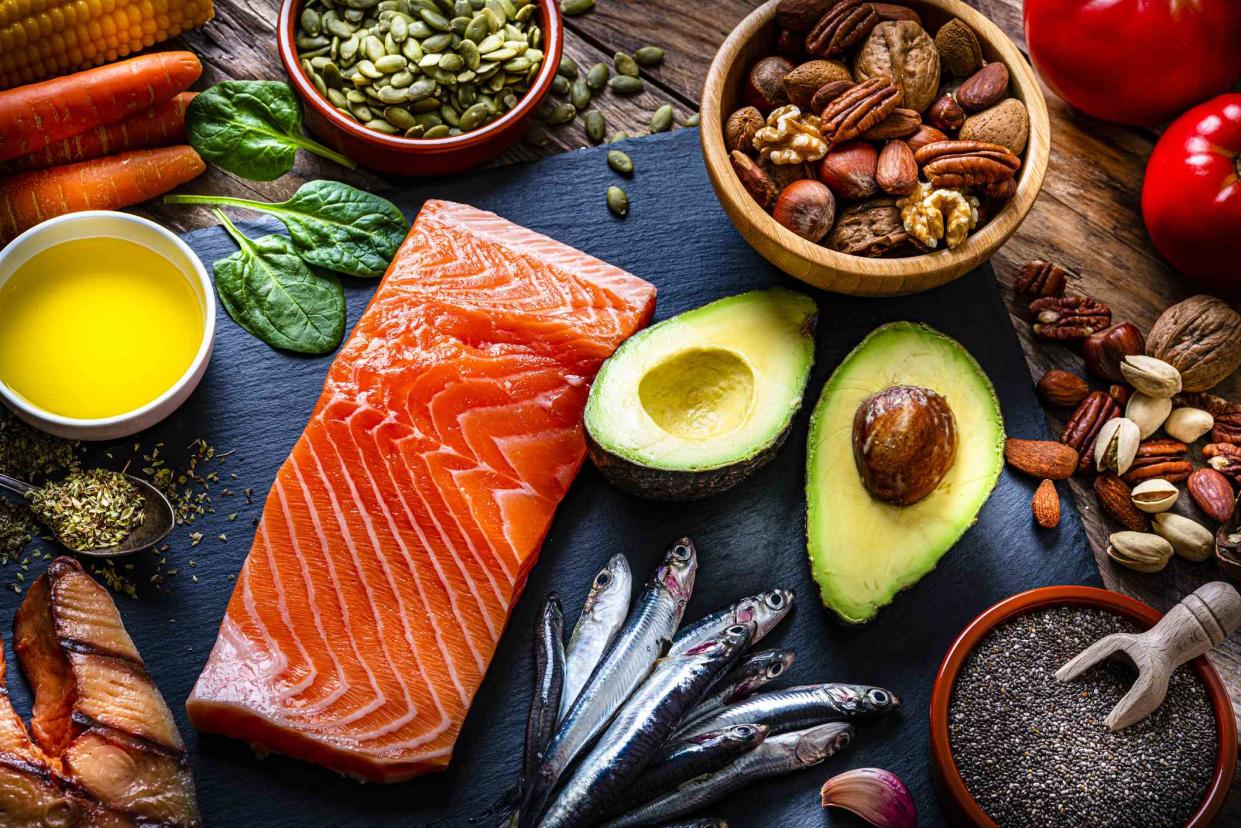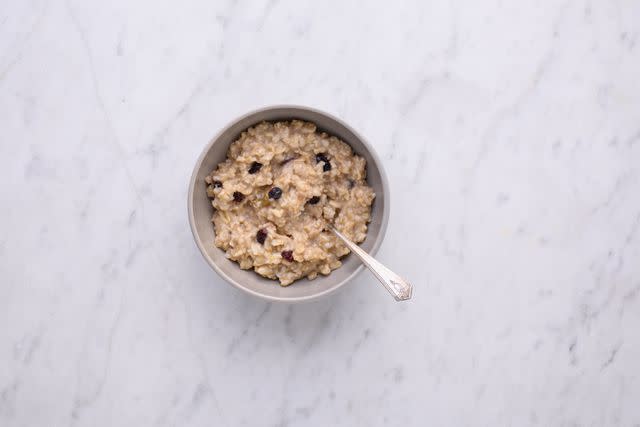7 Foods for Better Joint Health, According to a Dietitian

Getty Images / fcafotodigital
Medically reviewed by Melissa Rifkin, MS, RD, CDN
The aches and pains of aging may be around the corner, but creaky bones and tender joints don't have to put a damper on your future. With a little insight, these foods could help you improve your joint health and put joint pain on hold.
A joint is a place where two or more bones come together to allow movement. Joints are made up of bones, a layer of cartilage that covers the bones, muscles, ligaments, and synovial fluid. Each of these is responsible for enabling movement without pain.
Maintaining healthy joints is important to help prevent or delay the onset of osteoarthritis. A balanced, nutritious diet is the mainstay of joint health. In fact, certain nutrients have been shown to reduce pain and improve joint mobility by decreasing inflammation, maintaining joint lubrication, and strengthening bones and muscles.
Incorporating a Joint-Friendly Diet
While there are several key nutrients that benefit joint health, a balanced diet overall is optimal for pain-free joints for the long haul. The USDA MyPlate provides a visual for building a balanced plate with a focus on protein and fiber-rich carbohydrates. To ensure you're getting a joint-friendly diet, be sure to incorporate a variety of fruits and vegetables. This will also help you maintain a healthy body weight which puts less stress on your joints and bones.
Diets rich in healthy fats, including omega-3 fatty acids, prevent and reduce inflammation, as well as reduce pain and swelling in tender joints. Additionally, high-fiber carbohydrates, fruits, and vegetables contain antioxidants, vitamins, minerals, and fiber that provide direct anti-inflammatory action where needed.
Related: 7-Day Anti-Inflammatory Meal Plan: Recipes & Prep
Foods for Better Joint Health
Joint pain can put a wrench in your day. Luckily, there are easy ways to improve and maintain the health of your joints. Maintaining a diet packed with delicious, nutrient-dense foods like the ones listed here will provide your joints the nourishment they need to function at their best, pain-free. Here are 7 science-backed foods to eat more of for joint health.
Salmon

Verywell / Alexandra Shytsman
Fatty fish like salmon, mackerel, and sardines, are chock-full of omega-3 fatty acids. These fats are known for their anti-inflammatory properties and can have a beneficial effect on those experiencing joint pain or suffering from osteoarthritis, a disease that leads to degenerative cartilage within joints. And since joint health is directly impacted by joint-specific inflammation, a diet rich in anti-inflammatory omega-3 fatty acids is necessary.
One meta-analysis determined that consuming fatty fish (such as salmon) at least twice per week resulted in lower rheumatoid arthritis activity and reduced the risk of developing the disease altogether.
Other sources of omega-3s: walnuts, chia seeds, and flaxseeds
Spinach

Verywell / Alexandra Shytsman
Leafy greens, including spinach, broccoli, and kale, are rich in antioxidants that work to suppress joint inflammation and reduce symptoms of rheumatoid arthritis. Spinach is also an excellent source of phytochemicals that attack free radicals and prevent oxidative damage.
Other sources of phytochemicals and antioxidants: broccoli, kale, turnips, carrots, celery, and pears
Related: The Importance of Phytonutrients for Your Health
Blueberries

Verywell / Alexandra Shytsman
Blueberries are a highly nutritious fruit exploding with phytonutrients and antioxidants. The polyphenols and flavonoids in blueberries prevent degenerative diseases like the ones associated with joint pain and reduce inflammation. Blueberries can also prevent bone loss and improve bone density as you age.
Other sources of phytonutrients and antioxidants: blackberries, strawberries, raspberries, and cranberries
Related: Polyphenols and Their Food Sources
Flaxseeds

Verywell / Alexandra Shytsman
Flaxseeds are an excellent source of vitamin E and omega-3 fatty acids. In fact, flax is the best plant-based source of omega-3s available.
Some research suggests that vitamin E can prevent cartilage degeneration and improve joint pain for those with osteoarthritis. Vitamin E may stop the progression of osteoarthritis by eliminating oxidative stress and reducing joint inflammation.
Omega-3s turn off the inflammatory response preventing joint deterioration and related diseases.
Other nutrient-dense nuts and seeds: chia seeds, walnuts, and almonds
Oatmeal

Verywell / Alexandra Shytsman
High-fiber whole grains including oatmeal, brown rice, and quinoa contain powerful anti-inflammatory properties that benefit overall health and maintain healthy joints.
One (1-cup) serving of oatmeal contains 4 grams of dietary fiber. One study observed the incidence of poor gut microbiota in patients with rheumatoid arthritis and those at risk. This suggests that incorporating fiber-rich whole grains, like oatmeal, can restore gut symbiosis and improve the body's immune response.
Other whole grains to consider: brown rice, quinoa, barley, buckwheat, and farro
Related: 10 Foods That Are Good for the Immune System
Turmeric

Verywell / Alexandra Shytsman
Turmeric is a plant that's been used for centuries for medicinal purposes. Within the past 35 years, researchers are beginning to recognize the benefits of turmeric use. Curcumin is the most notable nutrient in turmeric.
Both turmeric and Curcumin offer anti-inflammatory properties and have been used for thousands of years to relieve joint pain. Research suggests that Curcumin does in fact offer pain relief for those with osteoarthritis.
Related: The 7 Best Turmeric Supplements of 2023
Green Tea

Verywell / Alexandra Shytsman
Green tea contains more antioxidants than any other tea. Catechins, a type of antioxidant found in green tea, can reduce inflammation and protect cartilage from further degradation.
One study found that the antioxidant activity and anti-inflammatory properties of green tea reduced disease activity in subject participants with rheumatoid arthritis.
Other foods rich in catechins: matcha, apples, apricots, and strawberries
Related: The 9 Best Green Teas of 2023, According to a Dietitian
Additional Tips for Joint Health
Though your diet is an important link to maintaining healthy joints, lifestyle factors may be of greater concern. Take a few moments to evaluate your habits and use these tips for joint health:
Stay active. Being intentional about moving your body throughout the day can help your joints stay pain-free. Muscle weakness and a sedentary lifestyle are risk factors for osteoarthritis. Make it a point to sit less. Get up and walk around every hour, or do 30 minutes of low-intensity exercise most days of the week.
Lift weights. Muscle loss is inevitable as you age. Muscle weakness and muscle degeneration are risk factors for joint deterioration. On the other hand, weight-bearing activities like lifting weights can prevent muscle loss, improve strength, and reduce bone loss, all of which are important for healthy joints.
Reduce stress. Stress, anxiety, and depression have an impact on joint pain. Find ways to reduce stress daily. Try some of these ideas for stress relief: ten minutes of meditation, read your favorite book or listen to your favorite music, take a walk, talk to a friend, or reach out to a healthcare professional like a therapist.
Maintain a healthy body weight. Carrying around excess body weight puts stress on your joints, putting you at risk of joint pain. Focus on nourishing your body with balanced meals and snacks to promote a healthy body weight and prevent joint deterioration.
Related: The Benefits of Losing Weight
Bottom Line
A balanced diet rich in health fats, fiber, vitamins, minerals, and antioxidants is important for maintaining healthy joints. While there's no magic pill, incorporating these foods into your weekly nutrition routine can help ease pain and prevent future discomfort. Remember to discuss your concerns with your healthcare professional before making any dietary changes.

